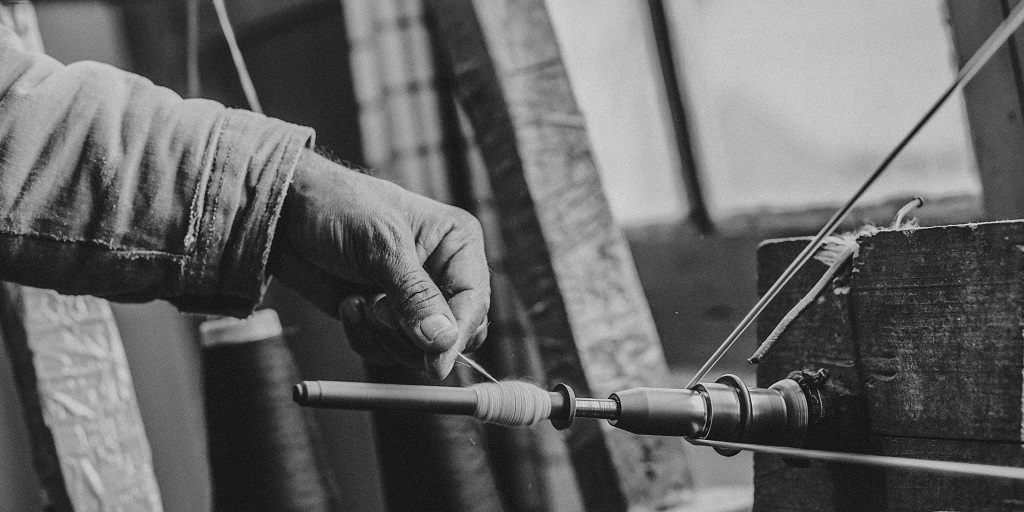
Department of
Textile Engineering
Textile is the most demandable in home and abroad for today’s fast fashion world and single source of rapid growth in Bangladeshi economy. It is the biggest sector where people can give maximum concern to become sustainable worldwide. Processing conventional, modern and sustainable textiles need a huge skillful manpower to perform all the responsibilities so that world’s demand has meet to desire level.
Textile engineering education is the backbone of producing skillful graduates for the textile sector who possess the interfacial skills and competencies needed for diverse efficient workforce. BGMEA University of Fashion & Technology visualized the demand of producing an expert workforce and introduced a department, Department of Textile Engineering which offers an undergraduate program that develops in the students the ability to take all responsibilities of a textile personnel and make intelligent business like decisions with discretion.
The department provide students a unique background on the latest development in textile engineering and technology in a wide range of subjects covering polymer sciences, high-performance fibers, technical-textiles, composite materials and new processes and machines to manufacture textile products, which allows them to pursue conventional and applied researches, intern experiences, and design projects ranging from both traditional and state-of-the-art production technologies to the design of both the usual and novel high performance products for human being and automotive and aviation industries respectively.
Vision of the department
Mission Statement
M 1: The essence of the Department of Textile Engineering is to constantly strive to provide an in-depth knowledge to its students so that they add value to the existing treasures of textile related concepts.
M 2: Promote lateral thinking and a spirit of enquiry among its students so that they look from a different angle through a creative approach by which they are able to provide simple solutions to complex technical problems in allied textile sectors.
M 3: To deliver through its teaching-learning process the richness of textile technology and multidisciplinary knowledge in a way where ethics and social commitments will be the cornerstone for its students.
Programs of Study
Students who opt for the Bachelor of Science in Textile Engineering program as their field of study can specialize in the study area of fiber science, manufacturing of different types of yarn and fabric, coloration method of fabric and apparel product development and construction. Studies in fiber science focus on different natural and man-made fibers. In yarn manufacturing students are able to learn about the manufacturing process of different types of yarn. After that they have the knowledge to manufacture fabric such as woven, knitted & non-woven fabric. Students have enough knowledge about the coloration process and finally they are able to construct different products such as menswear, womenswear, childrenwear, sportwear, etc. The program trains young technologists and professionals for the highly diverse and versatile range of technical knowledge in the textile industry.
The program consists of eight academic semesters and a total of 154 credits. Each semester contains modules from Majors, Deepening Specializations, Interdisciplinary Minors and General Electives. Academic Majors are the academic disciplines or program-related courses which the undergraduate students formally complete. Students are allowed to deepen their understanding of their core majors through a Deepening Specialization, which gives them a further edge in specific industries. Interdisciplinary Minors provide individuated pathways that would permit students to acquire multidisciplinary skill sets and opt for a group of subjects that complement studies in one’s major or explore an unrelated area of intellectual interest. General Electives are offered to the students to help them enhance their personality and develop interests in specific areas like values, personality development and character building, soft skills, communication skills, critical thinking skills, professional ethics etc.
Subjects Taught
Category wise courses and credits summary
| # | Areas | No. of Courses | Credits | Percentage |
|---|---|---|---|---|
| 1 | General Electives | 19 | 47.00 | 28.48 |
| 2 | Majors | 31 | 70.50 | 42.73 |
| 3 | Deeping Specializations | 11 | 25.00 | 15.15 |
| 4 | Interdisciplinary Minors | 11 | 22.50 | 13.64 |
| Total | 72 | 165.00 | 100 | |
Increased industry interaction for students through classroom lectures, tutorials, laboratory sessions, projects, field trips/factory visits, in-plant training/internships and part transaction in industry environment is the focus of the structured OBE curriculum. The contact hours are regulated to around 24 hours per week, giving increased time for tutorials, practical sessions, studio practices, group works and self-study to the students. The degree program is completed with an 8-week in-plant training/internship which the students do in an industry or a company, followed by the production of a Bachelor's Thesis/Final Year Project.
M.Sc. in TE (Code: 8111)
The M. Sc. in TE program consists of three academic semesters and a total of 38 credits. This thirty-eight credits comprise twelve credits of compulsory courses, eleven credits of core departmental courses, nine credits of elective courses and six credits of master’s thesis.
Core departmental courses are divided into four primary fields of study: yarn manufacturing engineering, fabric manufacturing engineering, wet processing engineering and apparel manufacturing engineering. Students who opt for the program complete an identical basic study stage, and then get the opportunity to choose their core study areas.
Profile of the program
- Name of the Degree: Master of Science in Textile Engineering, abbreviated as M. Sc. in TE
- Language of Instruction: English
- Courses Start: Spring (January) & Fall (July) each year
- Standard time to attain the Degree: 1.5 years (3 semesters, six months each)
- Minimum grade to attain the Degree: 2.50 in a scale of 4.00
Students acquire a specific knowledge of the relevant technologies used in advanced textile materials, composite technology, yarn production, weaving, knitting, wet processing, apparel manufacturing, finishing and technical textiles. The curriculum further includes studies in forward-looking technologies, and quality management.
The graduate program is completed with the production of a Master's Thesis cost of six credits.
B. Sc. in TE (Code: 801)
B. Sc. in TE program is divided into four core fields of study: yarn manufacturing engineering, fabric manufacturing engineering, wet processing engineering and apparel manufacturing engineering. Students who opt for the program complete an identical basic study stage, and then get the opportunity to choose their core study areas in the final year.
Profile of the program
- Name of the Degree: Bachelor of Science in Textile Engineering, abbreviated as B. Sc. in TE
- Language of Instruction: English
- Courses Start: Spring (January) & Fall (July) each year
- Standard time to attain the Degree: Four years (eight semesters, six months each)
- Minimum grade to attain the Degree: 2.50 in a scale of 4.00
The core study area in textile engineering delivers fundamental knowledge and insights extending from material design theory via textile manufacturing, textile processing, finishing technologies through to quality management and quality assessment of textile materials. Subjects from the fields such as basic sciences, mechanical engineering, electrical engineering, production engineering, business and humanities set the key accents in this program.
Students acquire a particular knowledge of the relevant technologies used in spinning, weaving, knitting, wet processing, apparel manufacturing, finishing and technical textiles.
The B. Sc. in TE program consists of eight academic semesters and a total of 165 credits. Each semester is subdivided into modules from the fields of: core courses (textile engineering) and others (natural sciences, humanities, business and other allied engineering). In addition, students are offered a total of six non-credits English courses. The degree program is completed with an 8-week internship which the students do in a company, followed by the production of a Bachelor's Thesis (Final Year Project, FYP).
The program additionally gives them an insight into various foreign mentalities, as well as intercultural knowledge.
Accreditation of the Programs
Both the M. Sc. in TE and B. Sc. in TE programs have been designed as per the clear instruction of the University Grants Commission (UGC) of Bangladesh, accordingly have been verified and approved by the proper authority nominated by the UGC.
Both the graduate and undergraduate programs offered by the department have been accredited by the Textile Institute, University of Manchester, UK.
Subjects Taught
The programs consist of:
M. Sc. in TE
| # | Areas | No. of Course | Credits | Percentage |
|---|---|---|---|---|
| 1 | Compulsory courses | 05 | 12 | 31.58 |
| 2 | Core departmental courses | 05 | 11 | 28.95 |
| 3 | Elective courses | 03 | 9 | 23.69 |
| 4 | Thesis | 01 | 6 | 15.78 |
Compulsory courses: 12 credits
Advanced Textile Materials: Its processes and properties
Technical Textiles & Composite Technology
Industrial Compliance & Labor Issues in Bangladesh
Professional Communication
Research Methodology
Core departmental courses (any one major): 11 credits
Yarn Manufacturing Engineering
Advanced Yarn Manufacturing (Short Staple)- I
Advanced Yarn Manufacturing (Long Staple)- II
High Performance Fibre Processing
Process Control in Spinning
Industrial & Experts Seminar
Fabric Manufacturing Engineering
Advanced knitting & Non-woven
Advanced Weaving
Advanced Fabric Design & Development
Process Control in Fabric Manufacturing
Industrial & Experts Seminar
Wet Processing Engineering
Advanced Polymer Science
Advanced Coloration of textiles
Advanced Printing & Finishing
Synthesis of dyes
Industrial & Experts Seminar
Apparel Manufacturing Engineering
Advanced Apparel Manufacturing
Advanced Apparel Engineering & Quality Control
Apparel Merchandising
Product Development & Fashion in Textiles
Industrial & Experts Seminar
Elective Courses (any three): 09 Credits
Global Supply Chain Management in Textiles
Analytical Methods & Techniques
Applied Mathematics
Instrumentation and Quality Analysis of Textiles
Industrial Organization of Textile in Global Economy
Innovation Management in Textiles
Sustainability & Eco-Certification in Textiles
Electronics & Controls in Textile Industry
Master’s Thesis: 06 credits
B. Sc. in TE
| # | Areas | No. of Courses | Credits | Percentage |
|---|---|---|---|---|
| 1 | General Electives | 19 | 47.00 | 28.48 |
| 2 | Majors | 31 | 70.50 | 42.73 |
| 3 | Deeping Specializations | 11 | 25.00 | 15.15 |
| 4 | Interdisciplinary Minors | 11 | 22.50 | 13.64 |
| Total | 72 | 165.00 | 100 | |
Core courses (extract)
Textile Raw Materials
Polymer Science
Yarn Manufacturing Engineering
Fabric Manufacturing Engineering
Introduction to Computer & Programming Techniques
Wet Processing Engineering
Apparel Manufacturing Engineering
Textile Testing & Quality Control
Textile Physics
Environment & Pollution Control
Fabric Structure & Design
Technical Textiles
Machine Technology & Maintenance of Textile Machinery
Colour Chemistry
Natural Sciences (extract)
Physics
Chemistry
Mathematics
Statistics
Allied Engineering (extract)
Engineering Drawing
Mechanics of Materials
Workshop Practice
Elements of Mechanical Engineering
Introduction to Computer & Programming Techniques
Elements of Electrical Engg. & Electronics
Elements of Theory of Machines & Machine Design
Production Planning & Control
Elements of Microprocessor Robotics control Engineering
Humanities & Business (extract)
English
Bangla Bhasha
Bangladesh Studies
Industrial Management
Accounting and Marketing
Business Communicative English
Corporate Social Responsibilities
Sociology and Industrial Organizational Psychology
Industrial Training & Final Year Project
Industrial Training (8 weeks ) - Placed in Industry
Project Work
Program Education Objectives [PEOs]
The educational objectives of B.Sc. in Textile Engineering program are as follows:
| PEO 1: | Graduates of B.Sc. in Textile Engineering program will have increasing responsibilities/advancement in positions in textile industries, textiles and allied sectors such as research & development, production, technical services and quality assurance. |
| PEO 2: | Graduates of B.Sc. in Textile Engineering program will become successful entrepreneurs/business partners in textile industries, textiles and allied sectors by starting new ventures/expansion of existing family business/product diversification, and contributing to societal, technological and industry development. |
| PEO 3: | Graduates of B.Sc. in Textile Engineering program will be engaged in life- long learning and professional development through participation/resource persons/publications in conferences, workshops, seminars, or pursue specialized studies in technical and engineering domains. |
Program Learning Outcomes [PLOs]
B.Sc. in Textile Engineering graduates will be able to:
| PLO 1: | Technical knowledge: Apply the knowledge of mathematics, science, technical fundamentals, and a technical specialization to the solution of complex technical problems. |
| PLO 2: | Problem analysis: Identify, formulate, review research literature, and analyze complex technical problems reaching substantiated conclusions using first principles of mathematics, sciences, and technical knowledge. |
| PLO 3: | Design/development of solutions: Design solutions for complex technical problems and design system components or processes that meet the specified needs with appropriate consideration for the public health and safety, and the cultural, societal, and environmental considerations. |
| PLO 4: | Conduct investigations of complex problems: Use research-based knowledge and research methods including design of experiments, analysis and interpretation of data, and synthesis of the information to provide valid conclusions. |
| PLO 5: | Modern tool usage: Create, select, and apply appropriate techniques, resources, and modern technical and IT tools including prediction and modeling to complex technical activities with an understanding of the limitations. |
| PLO 6: | The technologist and society: Apply reasoning informed by the contextual knowledge to assess societal, health, safety, legal and cultural issues and the consequent responsibilities relevant to the professional technical practices. |
| PLO 7: | Environment and sustainability: Understand the impact of the professional technical solutions in societal and environmental contexts, demonstrate the knowledge of, and need for sustainable development. |
| PLO 8: | Ethics: Apply ethical principles and commit to professional ethics, responsibilities, and norms of the technical practices. |
| PLO 9: | Individual and teamwork: Function effectively as an individual, and as a member or leader in diverse teams, and in multidisciplinary settings. |
| PLO 10: | Communication: Communicate effectively on complex technical activities with the technical community and with society at large, such as, being able to comprehend and write effective reports and design documentation, make effective presentations, and give and receive clear instructions. |
| PLO 11: | Project management and finance: Demonstrate knowledge and understanding of the technical and management principles and apply these to one’s own work, as a member and leader in a team, to manage projects and in multidisciplinary environments. |
| PLO 12: | Life-long learning: Recognize the need for, and have the preparation and ability to engage in independent and life-long learning in the broadest context of technological change. |
Program Specific Outcomes [PSOs]
B.Sc. in Textile Engineering graduates will be able to:
| PSO 1: | Apply the knowledge of mathematics, science, technical fundamentals and a technical specialization for process optimization, value analysis, productivity improvement, solutions to quality issues and product development in the domains of special fiber production, constructions of different fabric, sustainable dyeing methods and Ready-made garment industries & textile and allied sectors. |
| PSO 2: | Demonstrate learned techniques, experiments, modern technical tools and software to estimate the optimum resources such as raw materials, machineries and manpower to predict the properties of fibers, yarns, fabrics and garments as per the end uses. |


